I am getting this injection/JNDI-lookup error from my Java EE web application:
type Exception report
message
descriptionThe server encountered an internal error () that prevented it from fulfilling this request.
exception
javax.servlet.ServletException: PWC1392: Error instantiating servlet class OPRSystem.OPRSystem
root cause
com.sun.enterprise.container.common.spi.util.InjectionException: Error creating managed object for class: class OPRSystem.OPRSystem
root cause
com.sun.enterprise.container.common.spi.util.InjectionException: Exception attempting to inject Remote ejb-ref name=OPRSystem.OPRSystem/agent,Remote 3.x interface =AccountManager.Agent,ejb-link=null,lookup=,mappedName=,jndi-name=AccountManager.Agent,refType=Session into class OPRSystem.OPRSystem: Lookup failed for 'java:comp/env/OPRSystem.OPRSystem/agent' in SerialContext[myEnv={java.naming.factory.initial=com.sun.enterprise.naming.impl.SerialInitContextFactory, java.naming.factory.state=com.sun.corba.ee.impl.presentation.rmi.JNDIStateFactoryImpl, java.naming.factory.url.pkgs=com.sun.enterprise.naming}
root cause
javax.naming.NamingException: Lookup failed for 'java:comp/env/OPRSystem.OPRSystem/agent' in SerialContext[myEnv={java.naming.factory.initial=com.sun.enterprise.naming.impl.SerialInitContextFactory, java.naming.factory.state=com.sun.corba.ee.impl.presentation.rmi.JNDIStateFactoryImpl, java.naming.factory.url.pkgs=com.sun.enterprise.naming} [Root exception is javax.naming.NamingException: Exception resolving Ejb for 'Remote ejb-ref name=OPRSystem.OPRSystem/agent,Remote 3.x interface =AccountManager.Agent,ejb-link=null,lookup=,mappedName=,jndi-name=AccountManager.Agent,refType=Session' . Actual (possibly internal) Remote JNDI name used for lookup is 'AccountManager.Agent#AccountManager.Agent' [Root exception is javax.naming.NamingException: Lookup failed for 'AccountManager.Agent#AccountManager.Agent' in SerialContext[myEnv={java.naming.factory.initial=com.sun.enterprise.naming.impl.SerialInitContextFactory, java.naming.factory.state=com.sun.corba.ee.impl.presentation.rmi.JNDIStateFactoryImpl, java.naming.factory.url.pkgs=com.sun.enterprise.naming} [Root exception is javax.naming.NameNotFoundException: AccountManager.Agent#AccountManager.Agent not found]]]
root cause
javax.naming.NamingException: Exception resolving Ejb for 'Remote ejb-ref name=OPRSystem.OPRSystem/agent,Remote 3.x interface =AccountManager.Agent,ejb-link=null,lookup=,mappedName=,jndi-name=AccountManager.Agent,refType=Session' . Actual (possibly internal) Remote JNDI name used for lookup is 'AccountManager.Agent#AccountManager.Agent' [Root exception is javax.naming.NamingException: Lookup failed for 'AccountManager.Agent#AccountManager.Agent' in SerialContext[myEnv={java.naming.factory.initial=com.sun.enterprise.naming.impl.SerialInitContextFactory, java.naming.factory.state=com.sun.corba.ee.impl.presentation.rmi.JNDIStateFactoryImpl, java.naming.factory.url.pkgs=com.sun.enterprise.naming} [Root exception is javax.naming.NameNotFoundException: AccountManager.Agent#AccountManager.Agent not found]]
root cause
javax.naming.NamingException: Lookup failed for 'AccountManager.Agent#AccountManager.Agent' in SerialContext[myEnv={java.naming.factory.initial=com.sun.enterprise.naming.impl.SerialInitContextFactory, java.naming.factory.state=com.sun.corba.ee.impl.presentation.rmi.JNDIStateFactoryImpl, java.naming.factory.url.pkgs=com.sun.enterprise.naming} [Root exception is javax.naming.NameNotFoundException: AccountManager.Agent#AccountManager.Agent not found]
root cause
javax.naming.NameNotFoundException: AccountManager.Agent#AccountManager.Agent not found
Not sure what code to paste here, please let me know, thanks.
Here's my web.xml:
<?xml version="1.0" encoding="UTF-8"?>
<web-app version="3.0" xmlns="http://java.sun.com/xml/ns/javaee" xmlns:xsi="http://www.w3.org/2001/XMLSchema-instance" xsi:schemaLocation="http://java.sun.com/xml/ns/javaee http://java.sun.com/xml/ns/javaee/web-app_3_0.xsd">
<servlet>
<servlet-name>OPRSystem</servlet-name>
<servlet-class>OPRSystem.OPRSystem</servlet-class>
</servlet>
<servlet-mapping>
<servlet-name>OPRSystem</servlet-name>
<url-pattern>*.do</url-pattern>
</servlet-mapping>
<session-config>
<session-timeout>
30
</session-timeout>
</session-config>
</web-app>
This is my action class that intanties the ejbs:
package OPRSystem;
import AccountManager.Agent;
import AccountManager.Customer;
import AccountManager.Owner;
import RentalManager.FinancialInstitution;
import javax.servlet.http.HttpServletRequest;
/**
*
* @author ssome
*/
public abstract class Action {
private final String successpage;
private final String failpage;
protected Agent agent;
protected Customer customer;
protected Owner owner;
protected FinancialInstitution fi;
public Action(String success, String fail) {
this.successpage = success;
this.failpage = fail;
}
public abstract String perform(HttpServletRequest req);
/**
* @return the successpage
*/
public String getSuccesspage() {
return successpage;
}
/**
* @return the failpage
*/
public String getFailpage() {
return failpage;
}
/**
* @param agent the agent to set
*/
public void setAgent(Agent agent) {
this.agent = agent;
}
/**
* @param customer the customer to set
*/
public void setCustomer(Customer customer) {
this.customer = customer;
}
/**
* @param owner the owner to set
*/
public void setOwner(Owner owner) {
this.owner = owner;
}
/**
* @param fi the fi to set
*/
public void setFi(FinancialInstitution fi) {
this.fi = fi;
}
}
Here's my OPRSystem class:
package OPRSystem;
import AccountManager.Agent;
import AccountManager.Customer;
import AccountManager.Owner;
import RentalManager.FinancialInstitution;
import java.io.IOException;
import java.util.HashMap;
import javax.ejb.EJB;
import javax.servlet.RequestDispatcher;
import javax.servlet.ServletException;
import javax.servlet.annotation.WebServlet;
import javax.servlet.http.HttpServlet;
import javax.servlet.http.HttpServletRequest;
import javax.servlet.http.HttpServletResponse;
@WebServlet(name="OPRSystem", urlPatterns={"*.do"})
public class OPRSystem extends HttpServlet {
@EJB
private Agent agent;
@EJB
private Customer customer;
@EJB
private Owner owner;
@EJB
private FinancialInstitution fi;
private HashMap<String,Action> actions;
@Override
public void init() throws ServletException {
java.util.Date date = new java.util.Date();
java.sql.Date sqlDate = new java.sql.Date(date.getTime());
java.sql.Time sqlTime = new java.sql.Time(date.getTime());
agent.createAdmin(sqlDate, sqlTime);
actions = new HashMap<String,Action>();
LoginAction la = new LoginAction("/Welcome.jsp", "/index.jsp");
la.setAgent(agent);
la.setCustomer(customer);
la.setOwner(owner);
actions.put("login", la);
}
/**
* Processes requests for both HTTP <code>GET</code> and <code>POST</code> methods.
* @param request servlet request
* @param response servlet response
* @throws ServletException if a servlet-specific error occurs
* @throws IOException if an I/O error occurs
*/
protected void processRequest(HttpServletRequest request, HttpServletResponse response)
throws ServletException, IOException {
String next = "";
String op = getOperation(request.getRequestURL());
Action act = actions.get(op);
if (act != null) {
next = act.perform(request);
}
// Get the dispatcher
RequestDispatcher dispatcher =
getServletContext().getRequestDispatcher(next);
if (dispatcher != null)
dispatcher.forward(request, response);
}
public String getOperation(StringBuffer requestURL) {
int lastslash = requestURL.lastIndexOf("/");
int lastdot = requestURL.lastIndexOf(".");
String op = requestURL.substring(lastslash+1, lastdot);
return op;
}
// <editor-fold defaultstate="collapsed" desc="HttpServlet methods. Click on the + sign on the left to edit the code.">
/**
* Handles the HTTP <code>GET</code> method.
* @param request servlet request
* @param response servlet response
* @throws ServletException if a servlet-specific error occurs
* @throws IOException if an I/O error occurs
*/
@Override
protected void doGet(HttpServletRequest request, HttpServletResponse response)
throws ServletException, IOException {
processRequest(request, response);
}
/**
* Handles the HTTP <code>POST</code> method.
* @param request servlet request
* @param response servlet response
* @throws ServletException if a servlet-specific error occurs
* @throws IOException if an I/O error occurs
*/
@Override
protected void doPost(HttpServletRequest request, HttpServletResponse response)
throws ServletException, IOException {
processRequest(request, response);
}
/**
* Returns a short description of the servlet.
* @return a String containing servlet description
*/
@Override
public String getServletInfo() {
return "Short description";
}// </editor-fold>
}
Here's my project structure:
